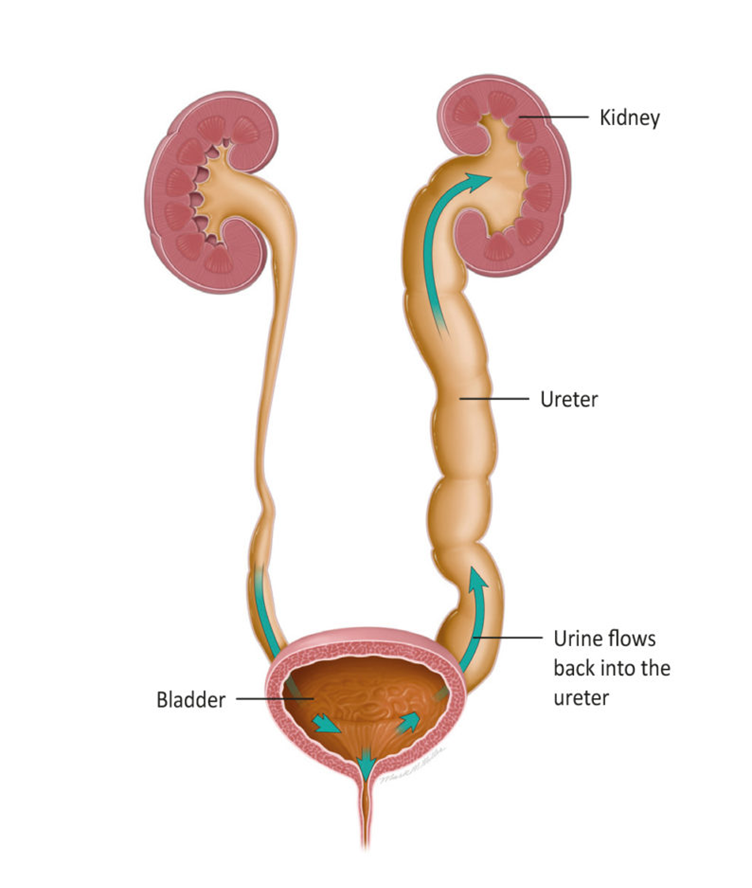A young child is diagnosed with vesicoureteral reflux. The nurse should know that this usually leads to:
Infarction of the renal vessels
Renal calculi
Urinary obstruction
Recurrent kidney infections
The Correct Answer is D
The correct answer is d) Recurrent kidney infections.
Choice A reason:
Infarction of the renal vessels is not a common consequence of vesicoureteral reflux (VUR). Infarction refers to tissue death due to a lack of blood supply, which is not typically associated with VUR1. VUR primarily affects the urinary tract, leading to the backward flow of urine from the bladder into the ureters and kidneys. This condition can cause other complications, but infarction of the renal vessels is not one of them.
Choice B reason:
Renal calculi, or kidney stones, are not directly caused by vesicoureteral reflux. While VUR can lead to urinary tract infections (UTIs), which may increase the risk of developing kidney stones, it is not the primary outcome. Kidney stones are typically formed due to an imbalance of minerals and salts in the urine, leading to crystallization. VUR itself does not directly cause the formation of renal calculi.
Choice C reason:
Urinary obstruction is not a typical result of vesicoureteral reflux. VUR involves the backward flow of urine, but it does not usually cause a physical blockage in the urinary tract. Urinary obstruction can occur due to other conditions, such as congenital abnormalities, tumors, or kidney stones, but it is not a direct consequence of VUR.
Choice D reason:
Recurrent kidney infections are a common complication of vesicoureteral reflux. The backward flow of urine can carry bacteria from the bladder into the kidneys, leading to repeated episodes of pyelonephritis (kidney infection). These recurrent infections can cause kidney damage over time if not properly managed. Therefore, it is crucial to monitor and treat VUR to prevent recurrent kidney infections and preserve kidney function.

Nursing Test Bank
Naxlex Comprehensive Predictor Exams
Related Questions
Correct Answer is A
Explanation
Choice A reason:
Wearing cotton underpants is recommended to prevent urinary tract infections (UTIs) in young girls. Cotton is a breathable fabric that allows air to circulate, reducing moisture and creating an environment less conducive to bacterial growth. This helps to keep the genital area dry and clean, which is important in preventing UTIs.
Choice B reason:
Limiting trips to the bathroom is not recommended for preventing UTIs. In fact, it is important for young girls to urinate frequently to flush out bacteria from the urinary tract. Holding urine for extended periods can increase the risk of bacterial growth and infection. Therefore, encouraging regular bathroom trips is a better practice for preventing UTIs.
Choice C reason:
Decreasing salt intake is not directly related to preventing UTIs. While a healthy diet is important for overall health, there is no specific evidence linking salt intake to the prevention of urinary tract infections. The focus should be on practices that directly reduce the risk of bacterial growth and infection in the urinary tract.
Choice D reason:
Soaking in a bathtub, especially with bubble baths or perfumed soaps, can increase the risk of UTIs. These substances can irritate the urethra and create an environment conducive to bacterial growth. It is better to avoid prolonged baths with such products and instead opt for quick showers to maintain hygiene without increasing the risk of infection.
Correct Answer is A
Explanation
Choice A reason:
Cleansing the suture line, maintaining an upright position, and using arm restraints are crucial aspects of postoperative care for an infant after cleft lip repair. Cleansing the suture line helps prevent infection and promotes healing. Keeping the infant in an upright position reduces the risk of aspiration and helps with breathing. Arm restraints prevent the infant from touching or rubbing the surgical site, which could disrupt the healing process.
Choice B Reason:
Mouth irrigations and a prone position are not recommended for postoperative care after cleft lip repair. Mouth irrigations can be too harsh for the delicate surgical site, and a prone position (lying face down) can increase the risk of aspiration and breathing difficulties. Cleansing the suture line is important, but the other aspects of this choice are not suitable.
Choice C Reason:
Frequent oral suction and spoon feeding are not appropriate for an infant after cleft lip repair. Oral suction can be too aggressive and may damage the surgical site. Spoon feeding is not recommended as it can put pressure on the healing lip. Giving a teething toy is also not advisable as it can cause the infant to put objects in their mouth, potentially harming the surgical site.
Choice D Reason:
Arm restraints are indeed necessary to prevent the infant from touching the surgical site. However, postural drainage and mouth irrigations are not suitable for postoperative care after cleft lip repair. Postural drainage is not relevant to this condition, and mouth irrigations can be too harsh for the healing tissue.
Whether you are a student looking to ace your exams or a practicing nurse seeking to enhance your expertise , our nursing education contents will empower you with the confidence and competence to make a difference in the lives of patients and become a respected leader in the healthcare field.
Visit Naxlex, invest in your future and unlock endless possibilities with our unparalleled nursing education contents today
Report Wrong Answer on the Current Question
Do you disagree with the answer? If yes, what is your expected answer? Explain.
Kindly be descriptive with the issue you are facing.
